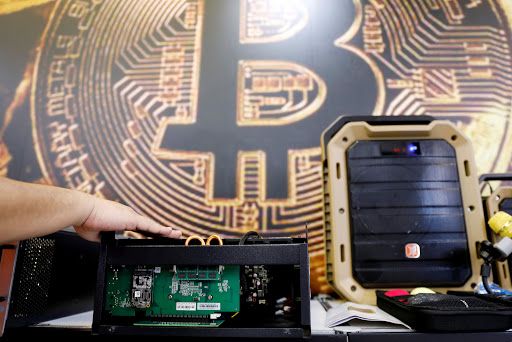The future of cryptocurrency

A few minutes every morning is all you need.
Stay up to date on the world's Headlines and Human Stories. It's fun, it's factual, it's fluff-free.
“I believe it’s going to be a very short timeline for crypto to become an extremely large player." — Crystal Rose, CEO of MakeSense Labs.
Cryptocurrency is certainly not without its critics. Some point to its unpredictability in terms of online security, while others suggest that it’s simply unfit to act as a long-term, stable currency.
In any case, it’s become increasingly clear that cryptocurrencies will remain a topic of conversation for years to come. With that in mind, what do experts anticipate for the future of cryptocurrencies?
Blockchain, the technology that is used to pioneer digital currencies, is a system shared across numerous devices that acts as a kind of “library” for transactions. Essentially, this library cannot be touched or edited after a transaction has been recorded.
In order for this system to operate successfully, it must be shared across devices that belong to different users in different locations. By doing this, transactions cannot be altered by any one, single person, so the need for a centralized authority to oversee the system is eliminated. Thus, Blockchain is able to run entirely independently as an entity and is based on a 51% vote among users in order to alter any past data.
This means that if the majority of users don’t agree on a particular modification, it’s quickly deemed unsubstantiated and cast aside as an error.
Nevertheless, since this is a system composed of shared data, it’s unsurprising that it has become a target for hackers. And so, the question arises: just how safe is such a form of currency?
Alex Postlmayr, the chief executive officer of Coinpay, tells TMS that there are two ways to approach the security of cryptocurrency.
“From a technical perspective, the chance of a hacker cracking the code – or, for instance, spending the Bitcoin that you have in your wallet – is like finding one atom in the entire observable universe.”
Still, Postlmayr maintains that “from a more practical perspective, if you go on the internet and talk about how much Bitcoin you have, you could make yourself a target.”
This is where modes of storage come into play.
Principally, to open any wallet, users must create a 256-digit private key made up of a series of ones and zeros within a cryptocurrency storage platform. This can sit on your computer, on an offline device, or even as an app on your phone.
An app on your phone for storage would be like “the money in your purse,” Crystal Rose, CEO of MakeSense Labs and one of Forbes Top 10 Women in Blockchain, tells TMS. Some of these apps include AnkerPay, Jaxx and EOS.
“In your regular wallet, you probably wouldn’t hold large sums of money. Here, you’d go with ‘cold storage,’ where your information is stored in an offline device. For this, there are classic wallets like MyCrypto, Ledger, and Treasure,” says Rose.
But this creates a new problem: one of personal accountability.
“It’s a funny concept having to become your own bank, and I think there’s an inherent challenge in asking people to store their own keys – [keys] that are so valuable that, if lost, you never have access to your cryptocurrency again,” Rose remarks.
“So, we fall back on paper,” she continues. “The best way to store your private key is on a piece of paper within a fireproof safe. This is almost the same as storing cash. It can be put in your pocket and travel with you, but it is scary.”
“I think this is going to pose a bigger challenge than the potential for hacking,” Rose adds. “And I think exchanges are underrated when it comes to the security of your assets. Just make sure that they have good funding and are compliant with regulatory standards.”
Rose suggests that this is not dissimilar to storing your wealth in an online banking system.
“I have heard that there’s a fear around quantum computing, an advanced-processing ‘supercomputer’ coming online in the next few years that could crack every password.”
This could conceivably include your online banking password.
As a result, experts suggest purchasing your cryptocurrency with companies that you can trust.
“I think you’re going to have multiple digital wallets,” says Postlmayr. “Maybe you trust that if you store your cryptocurrency with Amazon, they’ll be able to protect them.”
Postlmayr adds that it’s relatively simple to track down stolen cryptocurrency.
“Although it’s anonymous, it’s transparent,” he says. “It’s a non-changeable, permanent record-keeping system.” This means that the moment it is spent or transferred from the hacker, an auditor could locate exactly where the currency is.
All the same, Postlmayr urges people interested in cryptocurrency to utilize companies that allow them to create their own wallets.
“Companies like Robinhood and PayPal own the cryptocurrency on your behalf (and treat it more as a stock), meaning you don’t actually own the coin. There’s a phrase in the Bitcoin world that says, ‘Not your private key, not your Bitcoin.’”
The downside to this is that “when you buy cryptocurrency through a system like Coinpay, you are bound by Know-Your-Customer anti-money laundering laws,” says Postlmayr. This means that your account is connected to an email address, phone number, or other form of identity verification.
But perhaps anonymity is not the fundamental advantage to owning a cryptocurrency. If not, what is?
Advantages
“It’s fast, secure, and global,” Postlmayr tells us.
“I can store a million dollars in Bitcoin on a USB, but it’s much harder to store a million dollars in cash. The benefit of cryptocurrencies is that I can swap it out and send it around the world instantly, with no exchange fees and no processing time,” he says. “Our world is already so global. Now, we’re just getting rid of the inefficiencies.”
Regardless, the future is not without its challenges for digital currency.
Challenges
At the outset, many cryptocurrencies are wildly unstable.
“I think that while it’s interesting that PayPal and other merchants are beginning to accept Bitcoin, it’s not a very good form of actual currency,” says Rose.
“I would say that for anyone that wants to get into cryptocurrency in a way that feels safe, you can put some into a stable coin and some into other forms of currency.”
A stable coin is digital currency that is not subject to volatility.
“The only thing that I would say about stable coins is that when looking at a stable coin in your own local fiat currency, be very cautious with the people who have created it to be sure that the backing actually exists. You wouldn’t want something that said it was backed by gold without having all of the gold in storage to prove it.”
“This is what the national currencies might emulate, backed by their own reserves,” Rose adds.
Another potential issue analysts foresee is potential governmental regulation.
“Governments are going to either adopt it or regulate it, and we are going to potentially see challenges with both,” says Rose.
“With cryptocurrency, the advantage is that it is a digital, intangible asset that can be traded globally and has no boundaries, and I think that scares governments.”
But it’s clear that some countries may be more willing to embrace the new age of centralized digital currency. In fact, China has already begun piloting its own digital currency, known as “digital yuan.”
In any case, while the future remains unclear, some common themes are beginning to emerge.
The future of cryptocurrency
“The number one thing is that digital currency is just the first application,” Rose says. “If we want to look ahead and get ahead of the game, look to all of the industries that are going to change, shift, and evolve based on Blockchain technology. This could potentially change every facet of the internet world as we know it.”
“My new favorite emerging concept or technology built on Blockchain is called NFT (non-fungible tokens). The basis for this is that all types of collectibles will be digitized. Things like art, wine, and high fashion will find their own identity on a Blockchain.”
“If people feel like they missed the wave of crypto, NFTs are a very interesting one to look towards and are potentially more accessible.”
Postlmayr is similarly optimistic about the future of NFTs and cryptocurrency.
“NFT’s, or the copyright coin, introduce applications of this technology into anything imaginable. So, if you’re an art collector purchasing a Picasso, you want to make sure that it’s an original.”
Similarly, Postlmayr believes that “in the future, we’ll have digital currencies for everything. So, just like you have Farmville coins and store credits, this will all be digitized.”
And the coronavirus pandemic is having a huge impact on this expansion.
“We’re a germ-conscious environment,” he says. “People don’t even want to tap their credit card anymore, much less exchange cash.”
Instead, he proposes that he will “buy [his] items by picking them up and walking out of the store,” alluding to a relatively new concept called Amazon Go, an automated checkout free shopping experience.
As for the safety of Bitcoin, Postlmayr says he has even “heard the idea that Bitcoin is being looked at now as having already stood the test of time.”
“It’s robust and has experienced stress-tests to the Nth degree, but it’s still overcome all of the naysayers,” he tells us.
“I think a timeline for a new technology to be massively adopted is around twenty years, and Bitcoin has already existed for roughly eleven,” says Postlmayr. “I would say another 10 years is when there’s going to be a lot of digital and crypto currencies.”
But Rose forecasts a far shorter period, pointing to the coming year as a potential “watershed moment for cryptocurrency.”
“Because it’s been adopted by the largest banks in the world, the largest institutions, and some of the biggest brand names have attached their names to it – and given that hundreds of millions of people have direct access to cryptocurrency – in one to two years, we can see it double or quadruple.”
“I believe it’s going to be a very short timeline for crypto to become an extremely large player,” she says.
But regardless of the time frame, it’s clear that most experts agree the “watershed moment” remains a certainty and, as Postlmayr points out, “Bitcoin is already the sixth largest currency in the world.”
Have a tip or story? Get in touch with our reporters at tips@themilsource.com




Comments ()